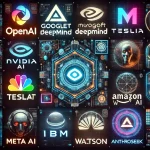The AI industry landscape is evolving at an unprecedented pace, with Microsoft, Google, and Meta fiercely competing for dominance. AI competition is driving massive investments, with tech giants pouring billions into research and development.
By 2024, the global AI market is expected to exceed $500 billion, fueled by generative AI, cloud-based AI, and AI-powered software.
Key Question: In this highly competitive AI industry, who will emerge as the leader—Microsoft, Google, or Meta?
1. Microsoft: Dominating Enterprise AI with OpenAI Partnership
1.1 Microsoft’s AI Strategy
- Core Strategy: Strong partnership with OpenAI, integrating ChatGPT into Microsoft products
- Key Products: Copilot (AI assistant), Azure AI cloud services, Bing AI search
- Business Model: Enterprise-focused AI (B2B), integrating AI into office software and cloud computing
1.2 Competitive Advantages
✅ Exclusive collaboration with OpenAI, being a key partner for GPT-4 and future models
✅ Azure AI empowers enterprises, ranking second only to AWS in cloud computing
✅ AI deeply integrated into Office ecosystem, with Copilot enhancing productivity in Word, Excel, and other tools
1.3 Competitive Disadvantages
❌ Heavy reliance on OpenAI, lacking strong in-house AI development
❌ Bing AI search still lags far behind Google in market share
📌 Case Study: Microsoft’s Office Copilot has been widely adopted by major enterprises like JPMorgan Chase and Walmart, significantly improving work efficiency.
2. Google: Strengthening AI Leadership with Gemini
2.1 Google’s AI Strategy
- Core Strategy: Developing proprietary AI models (Gemini), deeply integrating AI with search, advertising, and cloud computing
- Key Products: Gemini (formerly Bard), Vertex AI, TPU AI chips
- Business Model: Hybrid B2C and B2B approach, leveraging AI for search advertising and enterprise solutions
2.2 Competitive Advantages
✅ Dominates the global search engine market, with a 91% market share, enhancing search with AI capabilities
✅ DeepMind’s strong AI research, leading in AI fundamental research
✅ Proprietary AI chip TPU, optimizing AI computing and reducing enterprise costs
2.3 Competitive Disadvantages
❌ Early Gemini versions underperformed, offering a less competitive user experience than ChatGPT
❌ AI commercialization progress is slower compared to Microsoft’s enterprise AI solutions
📌 Case Study: Google’s Gemini (formerly Bard) was significantly upgraded in 2024, integrating into YouTube, Gmail, and Google Workspace, enhancing content recommendation accuracy.
3. Meta: Leading AI-Generated Content (AIGC) and Social AI
3.1 Meta’s AI Strategy
- Core Strategy: Building an AI-generated content (AIGC) ecosystem and integrating AI deeply into social platforms
- Key Products: Llama (proprietary AI model), AI-powered advertising, Meta Horizon AI (VR/AR AI)
- Business Model: Monetizing social data + AI-generated content (AIGC) through advertising
3.2 Competitive Advantages
✅ Largest social media ecosystem, owning Instagram, Facebook, and WhatsApp
✅ Open-source AI model (Llama), fostering a developer-friendly ecosystem
✅ Broad AIGC applications, spanning advertising, creative design, and short video content
3.3 Competitive Disadvantages
❌ Lower AI research investment compared to Microsoft and Google
❌ Revenue is heavily reliant on advertising, with limited AI monetization pathways
📌 Case Study: Meta leveraged AI-powered recommendation algorithms on Instagram and Facebook to improve ad conversion rates and introduced AI-generated avatars and stickers, gaining traction among younger users.
4. Future Predictions: Who Will Lead the AI Era?
| Microsoft | Meta | ||
|---|---|---|---|
| AI Ecosystem | OpenAI partnership | DeepMind + Gemini | AI-generated content (AIGC) |
| Cloud AI | Azure AI cloud computing | Google Cloud AI | No major cloud service |
| Business Model | B2B (Enterprise AI) | Hybrid B2C + B2B | B2C (Social + AIGC) |
| Core Strengths | AI-powered office software | AI search + cloud computing | AI-generated content (AIGC) |
| Weaknesses | OpenAI dependency | Slow commercialization | Lower R&D investment |
| Future Potential | Enterprise AI dominance | AI-powered search and cloud leadership | AIGC innovation leader |
📌 My Take: In the short term, Microsoft is likely to dominate the enterprise AI market, while Google maintains its strength in AI-powered search but needs faster commercialization. Meta holds a unique position in the AIGC space but lacks the AI research depth of Microsoft and Google.
The AI Battle Continues
- Microsoft is leading enterprise AI, leveraging OpenAI to drive AI adoption.
- Google remains strong in AI-powered search and cloud services but must accelerate commercialization.
- Meta dominates social AI and AIGC but has a weaker enterprise AI presence.
What’s Next?
🚀 The AI industry is rapidly evolving. Will Microsoft continue to dominate enterprise AI? Can Google’s Gemini catch up with OpenAI? Will Meta’s AI-generated content reshape the future of social media?
💬 Join the discussion! Share your thoughts in the comments. Who do you think will lead the AI race?







